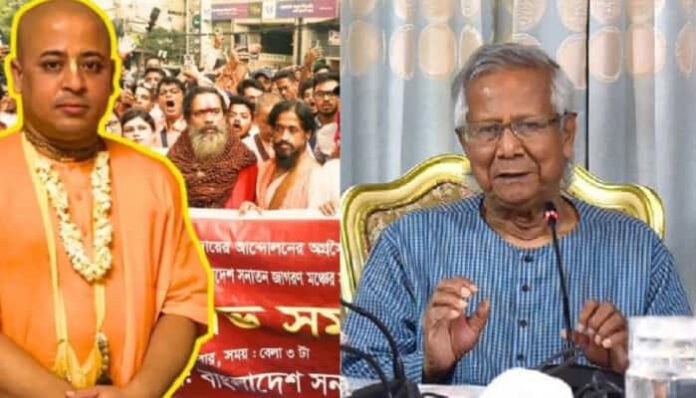Recent developments in Bangladesh have brought significant attention to the plight of religious minorities, particularly in the wake of political upheaval and the arrest of a prominent Hindu leader. This escalating crisis has drawn international criticism and raised questions about communal harmony and minority rights in the country.
Political Context
Since the resignation of Prime Minister Sheikh Hasina on 5 August 2024, Bangladesh has witnessed a surge in violence targeting religious minorities, notably Hindus, the largest minority group in the predominantly Muslim nation. Reports indicate that between August 5 and 8, over 200 incidents of vandalism against temples and places of worship occurred, with at least four fatalities among minority communities.
The newly installed interim government, led by Nobel laureate Muhammad Yunus, has pledged to address these attacks and safeguard the rights of all citizens. However, this commitment is being tested amid ongoing unrest and violence.
The Arrest of Chinmoy Krishna Das
The situation escalated further with the arrest of Chinmoy Krishna Das, a prominent Hindu leader associated with the International Society for Krishna Consciousness (ISKCON). He was detained on charges of sedition linked to his participation in a rally advocating for minority rights. The arrest, which took place at Dhaka airport, has been criticized as politically motivated and discriminatory.
- Protests and Violence: Demonstrations erupted in cities such as Dhaka and Chattogram, with protesters demanding Das’s release. These protests turned violent, with police using tear gas to disperse crowds. At least one person, a lawyer, was killed, and several others were injured in the clashes.
- Reactions from Minority Groups: Organizations like the Hindu Buddhist Christian Unity Council condemned the arrest, calling it a violation of human rights and freedom of expression. They also highlighted the broader pattern of violence and discrimination faced by minorities in Bangladesh.
Government and International Responses
The interim government has sought to downplay allegations of religious discrimination, asserting that Das’s arrest is unrelated to his faith and stems from specific legal charges. In a statement, Chief Advisor Muhammad Yunus emphasized the government’s commitment to communal harmony and criticized international reactions as “misconstrued.”
- Bangladeshi Government: Officials have dismissed reports of widespread violence against minorities, claiming some incidents have been exaggerated. They reiterated that all citizens have the right to practice their religion freely.
- India’s Concern: India’s Ministry of External Affairs expressed deep concern over the arrest and the broader violence against minorities in Bangladesh. India urged Bangladeshi authorities to ensure justice and the safety of minority communities, citing a troubling pattern of discrimination and attacks.
Ongoing Communal Tensions
The arrest of Chinmoy Krishna Das has become a flashpoint for broader communal tensions in Bangladesh. Minority communities have long faced issues of violence, displacement, and lack of accountability for attacks on their places of worship and property.
Activists and rights groups have called for stronger protections and immediate action to ensure justice for victims of recent violence. Meanwhile, the interim government is under pressure to demonstrate its ability to address these issues effectively amidst rising unrest.
Bangladesh’s current political and social climate highlights deep-seated challenges surrounding religious tolerance and minority rights. The arrest of Chinmoy Krishna Das and subsequent protests have underscored the urgency of addressing these issues to ensure communal harmony. While the interim government has pledged action, the effectiveness of its measures remains uncertain as tensions continue to simmer, both domestically and internationally.



